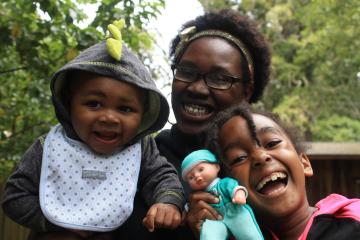
BAE Incubator partner series, part five: Seeking systems-level change to address housing instability

Homelessness in the United States is a pressing issue that requires increased research on effective strategies to address it and foster long-term housing stability. With grant funding from Google.org—Google’s philanthropic arm—the Bay Area Evaluation (BAE) Incubator supported Bay Area service providers with implementing and evaluating cash transfer programs to assess their impact on homelessness and housing stability. In part five of our BAE Incubator partner series, learn how this partnership with Google.org catalyzed three funded research projects.
Prior posts in the series highlighted the promise of cash transfers and the work of our partners, such as Compass Family Services, Abode Services, and Hamilton Families.
Homelessness and housing instability are pressing issues across the United States. In the California Bay Area alone, approximately 38,000 people were experiencing homelessness on a given night in January 2022. These challenges necessitate targeted investments in evidence-informed solutions and evidence generation, but resource constraints can limit the capacity of organizations to conduct and utilize research.
J-PAL North America’s Evaluation Incubators build the base of rigorous evidence by supporting organizations and government agencies to transform their research questions into comprehensive evaluation designs. The model provides selected partners with funding, technical assistance and training on evaluation design, and connections to J-PAL’s network of expert researchers. The Homelessness and Housing Stability team specifically aims to support service providers interested in evaluating innovative solutions to homelessness and housing instability.
In 2020, J-PAL North America’s Homelessness and Housing Stability team found this to be a common goal of Google.org, which is issuing $50 million in grant funding in support of Google’s $1 billion commitment to address housing and homelessness in the California Bay Area.
J-PAL North America, with support from Adrian Schurr, Regional Giving Lead at Google.org, customized the Incubator model to best meet the needs of Bay Area homeless service providers and create essential data on the impact of cash transfers. Evidence suggests that cash transfers hold promise in other contexts, but more evidence is needed to understand their effect on housing stability in the United States.
The resulting engagement—the Bay Area Evaluation (BAE) Incubator—catalyzed one pilot project and two full randomized evaluations by four leading service providers and three J-PAL affiliated researchers. (Google.org is also supporting additional pilots outside of the Incubator.)
In reflecting on this engagement, Adrian Schurr explained that,
“Google.org has supported J-PAL North America on a few different projects over the years, and it’s clear that when it comes to randomized impact evaluation, J-PAL is a leader in the space. The guidance J-PAL North America provided to our local homeless service providers to design and implement impact evaluations has been incredibly beneficial, particularly when planning these important cash transfer pilot programs for our community members experiencing homelessness. It’s important to understand the impact of this model, not only for the evaluations’ participants, but with the overall goal of having systems-level change to better help those experiencing housing instability. We’re hopeful that the work these nonprofits are doing, alongside J-PAL North America’s support, will have an outsized impact on how our society addresses homelessness.”
The BAE Incubator launched in November 2021 with six Bay Area organizations interested in piloting and evaluating cash transfer programs. J-PAL North America kicked off the engagement by providing three customized trainings on randomized evaluations, covering key concepts including theory of change, data and measurement, and design methodologies.
Over the course of the following year, J-PAL North America’s staff of policy and research experts provided technical assistance to Compass Family Services, Hamilton Families, Abode Services, and Larkin Street Youth Services to help build out their early-stage evaluation ideas. Staff then connected these partners to researchers in J-PAL’s network who worked with the organizations to design randomized evaluations of their programs. When describing the BAE Incubator in a J-PAL North America newsletter, Noah Halton, Director of Impact at Larkin Street, shared that “Through technical assistance, data benchmarking, and discussions with program staff, Larkin Street became confident in our ability to support a cash transfer pilot with a randomized evaluation.”
By December 2022—just over a year from the BAE Incubator’s launch—these organizations had gone from having a general interest in cash transfers to designing and preparing to launch evaluations. J-PAL North America’s Review Board approved funding for one pilot project (Larkin Street) and two full randomized evaluations (one led by Abode and one a collaboration between Compass and Hamilton).
Adrian noted that,
“Before launching the Incubator, we were anticipating only one project might progress to a feasible pilot stage. The fact that three projects were developed and approved spoke to the interest, commitment, and rigor of how everyone approached this opportunity. I’m really excited to see the outcome of all the work that went into the Incubator. We are collectively building a community of practice to capture learnings, navigate barriers, and innovate. These nonprofits are experts in service delivery, collaboration, and innovation. When we couple that with rigorous evaluations, we’ll be able to have a blueprint for innovative service delivery that will better serve the needs of our community members experiencing homelessness.”
These projects were the direct results of Google.org’s funding and each organization’s dedication and commitment to the process. They also demonstrate the potential of J-PAL North America’s Evaluation Incubator model to launch new research that can inform policy and transform lives. While it will take time before results are available, hundreds of individuals and families will receive financial support through these programs in the near future. Depending on what the results show, these projects could also impact scores more down the line by paving the way for investment in cash transfers and other innovative and evidence-informed policies.
As the Homelessness and Housing Stability team continues to generate evidence on innovative solutions to homelessness, we welcome the opportunity to collaborate. If you would like to explore a partnership or collaboration, please contact Bridget Mercier.
Related Content

BAE Incubator partner series, part two: Compass Family Services on taking evaluation to the next level

BAE Incubator partner series, part three: Abode Services on rigorous evaluation and elevating community voices



